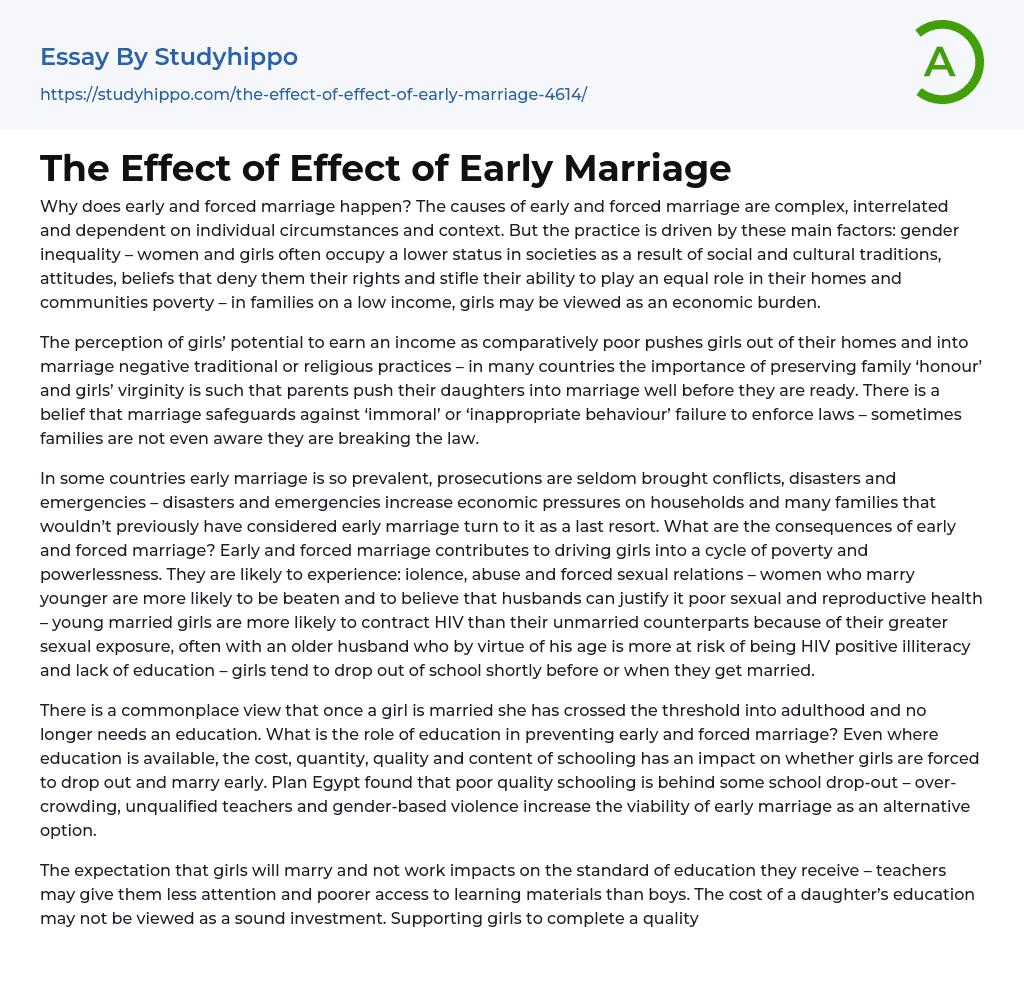Early and forced marriage is primarily caused by gender inequality and poverty. These factors are interconnected and complex, but they vary depending on individual situations and context.
- Gender inequality: Societal norms, cultural traditions, attitudes, and beliefs often result in lower social standing for women and girls. This deprives them of their rights and limits their participation within households and communities.
- Poverty: Girls from economically disadvantaged families may be viewed as a financial burden.
The low earning potential of girls often results in their expulsion from home and coerces them into marriage, due to negative traditional or religious customs. Numerous societies deem the preservation of family honor and a girl's virginity as vital, prompting parents to arrange marriages for their daughters prematurely. It is believed that matrimony safeguards against immoral or unsuitable conduct,
...with families sometimes unaware that they are acting unlawfully.
The practice of early marriage is prevalent in certain countries and often goes unpunished, particularly during times of conflicts, disasters, and emergencies when households face economic strain. Consequently, families turn to early marriage as a last resort. However, the consequences of this practice are significant. Girls who are compelled into early marriages become ensnared in poverty and powerlessness, resulting in various adverse outcomes like violence, abuse, and coerced sexual relations. These young women are more susceptible to physical abuse and hold the belief that their husbands can rationalize such violence. Additionally, they encounter challenges concerning sexual and reproductive health due to a higher risk of contracting HIV compared to unmarried peers as a result of increased sexual exposure with older husbands who have a greater likelihood of being HIV positive due to their age
Moreover, early and forced marriage leads to illiteracy and lack of education since girls typically abandon school either shortly before or after getting married.
Despite the common perception that marriage signifies a girl's transition into adulthood and makes education irrelevant, it is widely recognized that education is crucial in preventing early and forced marriages. Merely having access to education is insufficient; factors like expenses, quantity, quality, and curriculum also significantly impact whether girls are coerced to sacrifice their education and marry at a young age. Research carried out by Plan Egypt revealed that substandard schooling conditions contribute to girls abandoning their studies – problems such as overcrowded classrooms, inadequately trained teachers, and instances of gender-based violence make early marriage appear more appealing.
The expectation that girls will marry rather than work affects their education quality. Teachers may give them less attention and limited access to learning materials compared to boys. The cost of educating a daughter may not be considered a worthwhile investment. The best way to support girls in completing a quality basic education is by focusing on their rights. This involves ensuring that learning environments are safe, accessible, and inspirational. Girls should be able to travel to and from school safely, study in secure surroundings, have their specific needs accommodated, and teachers who sexually abuse students should face penalties. Education opportunities should be available and free, with schools built near communities and separate sanitation facilities provided. Parents and communities should be actively involved in school management, and campaigns highlighting the importance of girls' education should be carried out. Qualified teachers, especially female ones, should teach girls. Teachers should receive training on understanding girls' rights and
gender equality. Curricula for girls should be tailored to their needs, including teaching on sexual and reproductive health.
By educating and empowering girls, we can help promote consensual marriages in the future. This initiative also helps delay sexual initiation, lower rates of HIV and AIDS, and create greater gender equality. Various organizations like Plan and other NGOs have effectively implemented global education programs that have increased girls' school attendance and reduced early marriage. These programs aim to raise awareness about girls' rights and empower them to refuse early marriage.
The text highlights the significance of improving education and school retention for girls in the poorest nations to eradicate early and forced marriage. To achieve this goal, both national governments and the international community must take decisive and positive action. Governments can contribute by following human rights instruments like CEDAW, UNCRC, and UDHR that address issues related to forced and early marriage.
Currently, 86 countries have signed CEDAW; however, signatories don't always ensure effective implementation at a national level. Proper enforcement and increased awareness among girls and young women about their rights are crucial. Plan UK urges the UK Government to enhance its efforts in ending early and forced marriage through improved cooperation across Whitehall, expanded programming by the Department for International Development in developing nations, and using its influence to advocate for effective international policies and actions.
- Academia essays
- Higher Education essays
- Language Learning essays
- Studying Business essays
- Education System essays
- Study essays
- First Day of School essays
- Scholarship essays
- Pedagogy essays
- Curriculum essays
- Coursework essays
- Studying Abroad essays
- Philosophy of Education essays
- Purpose of Education essays
- Brainstorming essays
- Educational Goals essays
- Importance Of College Education essays
- Brown V Board of Education essays
- The Importance Of Higher Education essays
- Online Education Vs Traditional Education essays
- Academic And Career Goals essays
- Academic Integrity essays
- Brown Vs Board Of Education essays
- Distance learning essays
- Technology in Education essays
- Vocabulary essays
- Writing Experience essays
- Importance of Education essays
- Early Childhood Education essays
- Academic Degree essays
- Academic Dishonesty essays
- School Uniform essays
- Academic writing essays
- Cheating essays
- Bachelor's Degree essays
- MBA essays
- College Life essays
- Grade essays
- Diploma essays
- Phonology essays
- Sentence essays
- Filipino Language essays
- Pragmatics essays
- Millennium Development Goals essays
- History Of Education essays
- Graduate School essays
- Middle School essays
- School essays
- Special Education essays
- University essays




